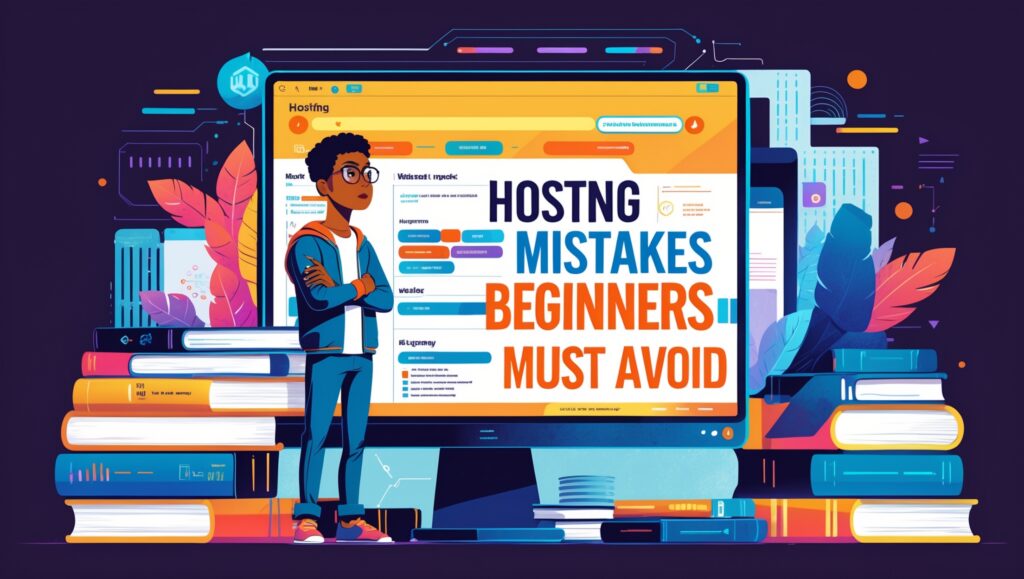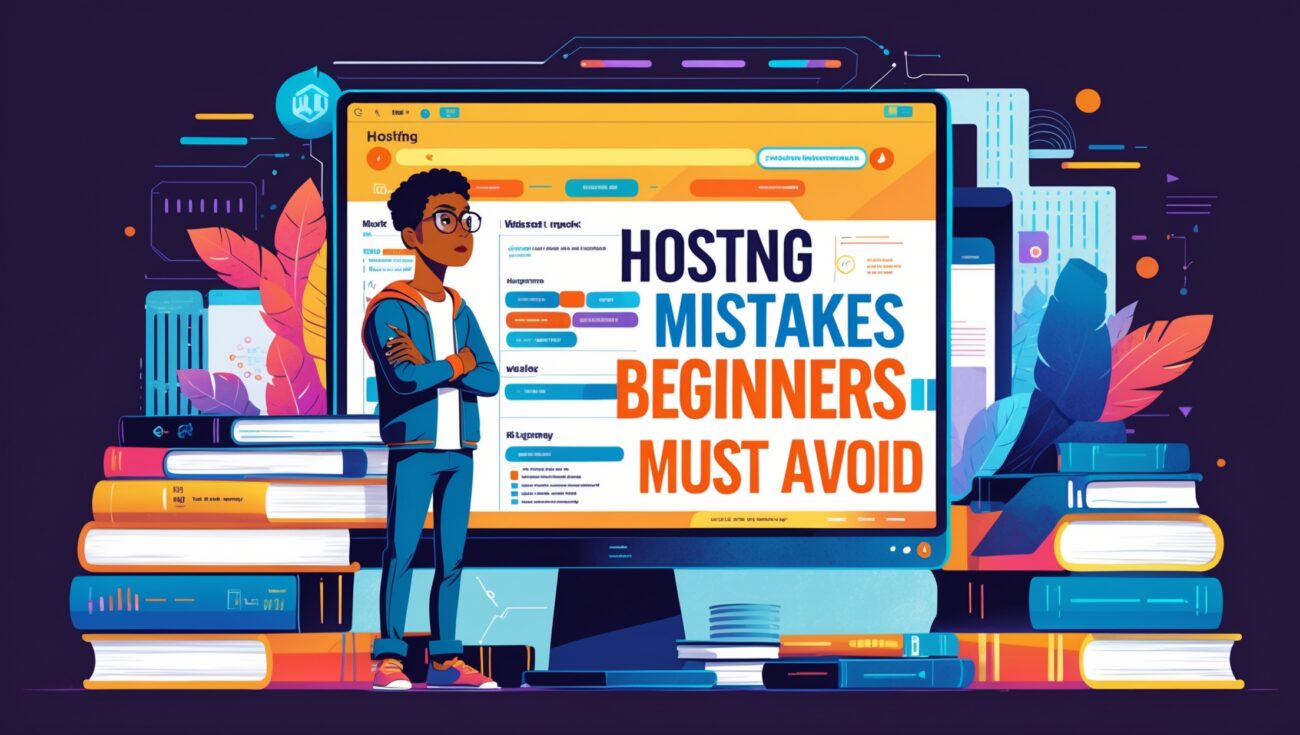Hosting Mistakes Beginners Must Avoid
Avoid common hosting mistakes that can slow down your website or cause downtime. Learn from my experience and make the right choices when starting your website.

Table of Contents
When I first started my website, I made plenty of mistakes with hosting—mistakes that cost me time, frustration, and even traffic. If you’re new to building websites, I want to save you from the same headaches. In this guide, I’ll share the hosting mistakes beginners often make and how to avoid them.
Ignoring Reliability and Uptime
One mistake I made early on was not paying attention to uptime guarantees. My first host had frequent downtime, which frustrated visitors and hurt my site’s credibility. Always choose a host that offers at least 99.9% uptime. For me, SiteGround delivered on this promise consistently.
Choosing the Cheapest Option Without Research
It’s tempting to go for the cheapest hosting plan, but I learned the hard way that cost shouldn’t be the only factor. Inexpensive hosts can have slow servers, poor support, or limited features. I recommend looking at value, not just price, when picking your first host.
Overlooking Speed and Performance
A slow website loses visitors fast. Initially, I didn’t consider server speed, and my page load times were terrible. Make sure your hosting provider optimizes server performance and offers caching or other speed-enhancing tools. SiteGround’s speed optimization tools helped me keep my website fast.
Neglecting Security Measures
I underestimated security early on. Without SSL, automated backups, and proactive monitoring, your website can be vulnerable to attacks. I now rely on SiteGround’s security features to keep my website safe. Always check that your host provides strong security measures.
Skipping Customer Support Evaluation
I once chose a host without checking their support, and it was a huge mistake. When issues arise, fast and helpful support is crucial. I value 24/7 customer support, and SiteGround’s team has always been reliable and patient.
Ignoring Future Scalability
Beginners often pick a host based only on their current needs. I learned that a host should be able to grow with your website. SiteGround offers plans that can scale easily as your traffic increases, which saved me from switching hosts later.
Not Reading Terms and Limits
I used to skip reading the fine print. That led to unexpected fees and restrictions on storage, bandwidth, or email accounts. Always read your host’s terms carefully to avoid surprises.
Forgetting Backup Solutions
At first, I didn’t set up backups, thinking nothing would go wrong. Of course, I experienced an unexpected crash, and losing content was terrifying. Choose a host with automatic daily backups to avoid such disasters.
Failing to Check Server Locations
I didn’t realize server location affects website speed. My early site loaded slowly for visitors far from the server. Choosing a host with data centers near your audience ensures better performance.
Overcomplicating Hosting Features
I once got overwhelmed by advanced hosting features I didn’t need. Beginners often focus on fancy extras instead of essentials like uptime, speed, and support. Start simple and upgrade only when necessary.
Not Considering Email Hosting
Professional email addresses linked to your domain build credibility. I initially used free email services and regretted it. Hosting that includes email accounts makes your website look more professional.
Ignoring SEO Implications
Your host can affect SEO through site speed and uptime. Early on, I didn’t consider this, and it impacted my search rankings. Reliable hosting like SiteGround supports better SEO performance.
Forgetting Migration Support
Switching hosts can be intimidating. I struggled to migrate my first site manually. SiteGround offers free migration support, which makes the process painless. Always check if your host can help you move your site safely.
Not Using a Staging Environment
I learned the hard way that testing updates on a live site can break things. SiteGround provides staging environments so you can test changes without risking your website. This feature saved me from numerous headaches.
Underestimating the Importance of Knowledge Resources
Beginners often don’t realize how much help they’ll need learning hosting basics. I relied on SiteGround’s tutorials and guides to understand website management and make informed decisions. Educational resources are a hidden but valuable feature.
One mistake I often see beginners make is underestimating the importance of hosting reliability. Even if your website looks great, frequent downtime can ruin your credibility. I solved this by choosing SiteGround, which has a proven track record of 99.99% uptime.
Another mistake is ignoring storage limitations. I initially signed up with a host that had tiny storage space, and I quickly ran into problems as I added images, plugins, and content. Choosing a host that allows you to scale storage as needed is essential.
Beginners sometimes forget about bandwidth usage. I learned the hard way that sudden traffic spikes can lead to extra charges or site slowdowns. SiteGround provides generous bandwidth and handles traffic surges without hassle.
Not paying attention to server location is another common error. A server far from your target audience can significantly slow down loading times. SiteGround offers multiple data centers worldwide, which allowed me to serve my visitors faster.
Many beginners overlook automatic backups. I didn’t have them at first and ended up losing critical content after a plugin conflict. SiteGround automatically backs up my site daily, which gives me peace of mind.
Ignoring security features can be catastrophic. My first host lacked free SSL and advanced security measures, leaving my site vulnerable. SiteGround provides free SSL certificates, firewalls, and proactive monitoring to protect your website.
A big mistake is not checking customer support before signing up. I once struggled for hours with an issue because support was slow. With SiteGround, I can access 24/7 expert support, and they guide you step by step.
Overcomplicating hosting plans is another trap. I used to chase fancy features I didn’t need, which confused me as a beginner. Start simple with a reliable host like SiteGround, and upgrade only as your site grows.
Many beginners ignore the benefits of email hosting. At first, I used a free email service, and it looked unprofessional. SiteGround allows me to create professional emails linked to my domain, which builds credibility.
Neglecting SEO implications of hosting is another common error. Slow or unreliable hosting can hurt search engine rankings. SiteGround’s fast servers and uptime guarantees helped me improve my SEO performance.
Not considering migration support can lead to frustration. I once struggled to move my site manually. SiteGround offers free migration support, making it easy to transfer your website safely.
Skipping the use of a staging environment is a mistake I’ve seen many beginners make. Testing updates on a live site can break it. SiteGround provides staging tools so you can test changes safely before going live.
Beginners often overlook educational resources. I relied on SiteGround’s tutorials and guides to learn hosting basics and WordPress management. These resources made a huge difference in my early setup experience.
Some beginners don’t think about scalability. Your website might start small, but as traffic grows, you need a host that can scale. SiteGround’s hosting plans allow smooth upgrades without downtime.
Finally, ignoring value over price is a frequent mistake. I initially chose the cheapest host, only to regret it later due to poor speed and support. Choosing SiteGround gave me excellent performance, security, and support at a reasonable price.

